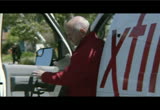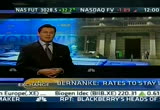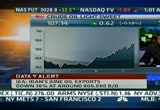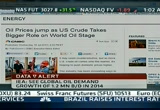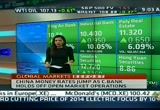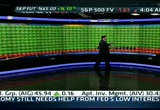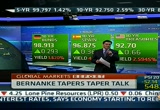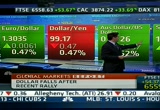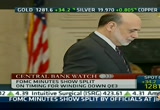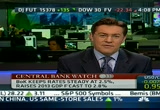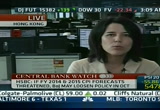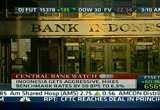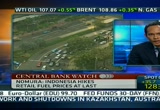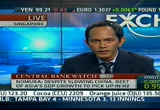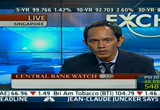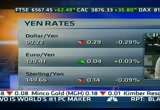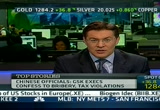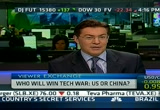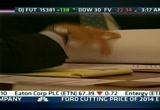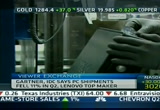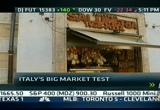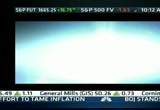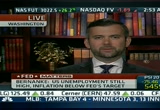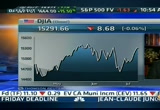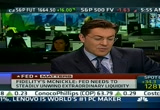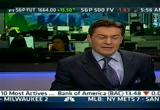tv Worldwide Exchange CNBC July 11, 2013 4:00am-6:01am EDT
4:00 am
you're now watching "worldwide exchange." i'm ross westgate. the headlines today. european equities follow asia higher after bere bernanke strikes a dovish tone, stressing rates will stay low for now, even if the central bank begins to wind down its asset purchases. unemployment is still high and inflation is low. >> both sides of our band-aid, the employment side and the inflation side, are saying that we need to be more accommodating. >> tapering inside japan even though they decide to trot out a
4:01 am
new r word, citing recovery, while sticking to its ultra easy policy. and all's well that ends well. shares of deutsche addington trade above the issue price. we'll speak to the ceo first in 45 minutes. warm welcome to you. plenty to get through today on the show. we kick off with the iea, predicting global oil demand growth of 1.2 million barrels a day in 2014. u.s. production will rise 530,000 barrels a day in 2014. nonopec by 1.3 million barrels a day. so the u.s. oil boom to erode opec market share, is essentially what they're talking about this morning. the north american share open
4:02 am
will leave one of the biggest rises in nonopec supply growth seen in the last two decades, which will help meet global demand and raise the share of opec. the outlook should give bulls some cause for alarm, because nonopec supply growth looks on track to hit a 20-year record. as you can see, wti up to 107.15. we hit 106 yesterday. big drawdown, much bigger drawdown in the u.s. department of energy inventory. 9.9 million barrels of inventory, expected to fall 2.9 million. the interesting thing is where wl th whether that supply will erode price or not. crude prices up $3 a barrel on wednesday. because of that big decline in crude stockpiles, you can head to cnbc.com to find out why the price is pushing higher and what that will do for domestic prices. also a piece online giving two
4:03 am
big reasons why gas prices might spike in the near future as well. we'll keep our focus on oil prices. other things to keep other focus on as well, sixuan in singapore. hi, sixuan. >> thank you, ross. a very positive session in asia with china markets leading the way. the shanghai composite enjoyed its best day in seven months, up 3.2%, rising hopes that beijing may introduce supported policies to boost the economy. hang seng in hong kong chocked up stunning gains of 2.6%. the money rates climbed to 3.8% after the pboc once again didn't conduct any open market operations. but that didn't seem to bother investors at all. and banking shares powered ahead with ping an and industrial up by 10%. and the sentiment lifted eight brokerage stocks to their daily upper limits.
4:04 am
poly real estate jumped over 6% today after reporting a 35% rise in its first half earnings. also market chatter that authorities will lose finance policies for property firms. as for the region's exporters, japanese electronics stocks lost ground today as the yen gained strength after the boj decision and bernanke comments about keeping the qe continue also weakening the u.s. dollar. but foreign buying propped up south korean tech shares. samsung electronics jumped over 5% in today's session, extending a three-day winning streak. and i have to show you the extraordinary gains among australian gold miners. they skyrocketed between 10 and 20% in today's session. so tracking higher prices of the precious metal. back to you, ross. >> sixuan, thank you for that. 8 to 1 advancers outpaid decliners on the dow jones 600. we are on the session low. ftse 100 yesterday down around 8
4:05 am
points. this morning, doing very well, best sector in dow jones industrial sector space. up another percent. xetra dax up 1.25. up two-thirds for the ibex. cac quarante up 1%. british foods posting an 8% rise in third quarter sales. the company attributed that performance to its primary discount clothing chain. worsening conditions in its australian business and overall of its uk will mean profits skewed toward second half of the year. but nevertheless, investors like what they hear. 4.5%. not so great for praktiker, shares crashing after a liqu liquidity short fall. we'll focus in on treasury yields now. 2.59%. we hit 2.75 at the beginning of the week. the highest for two years. we have come down. this time yesterday yielding
4:06 am
2.66%. right now, under 2.66%. there may be a view we go down to the june high, 2.3. we may be in a 50 basis point trading range. gilt rates also low and spanish yields, just under 4.8% at the moment. on the currency markets, sixuan talked about a big unwinding of dollar trades. very notable indeed. dollar/yep, back up to 99.19. got to 98.28. euro/dollar, up to 132. back down to 130. very volatile. we had a 1.27 yesterday. the aussie/dollar, around .9390 off that -- sorry .93 off the low, just back down to .9225. the unwinding of the dollar trades reversed as we go into the european session. sterling back over 1.50 after hitting 1.48.
4:07 am
all on the fact that mr. bernanke said the fed is in no rush to raise rates at his speech at the conference on wednesday. unemployment is higher and inflation remains low. he defended his decision to give a timetable for winding down the bond buying program, which could begin later this year and then be completed by mid-2014. >> i guess i would suggest that not withstand something volatility that we have seen in the last six weeks that speaking now and explaining what we're doing may have avoided much more difficult situation another time. >> and bernanke says if financial conditions tighten too much, they would have to push back. he was speaking after the release of the minutes from last month's fmoc meeting. the minutes showed the officials very split on the timing of when to start winding down qe 3.
4:08 am
that was the fed. we also had decisions today from the bank of japan. it was brought to you by the letter r, central bank held steady on policy saying japan was beginning to recover moderately. and for the seventh straight month, raised its economic view while sticking to its long-termer term growth outlook and to set inflation target. a similar picture in neighboring south korea. bok held rates at 2.5% as it raised its gdp forecast but warned that fed tapering and china slowdown are risks. joining us from hong kong is a japanese economist at hsbc and from singapore, the southeast asia economist at lamura. the bank of japan, are you -- how comfortable are you with the sustainability of the recovery? >> i think so far things are
4:09 am
going well. i do agree that there -- the sustainability of the recovery is dependent on part on the external environment. >> which one in particular? there is a couple. >> yeah, i mean, there is a risk of a u.s. growth slowdown in the third quarter. there is also china looming large, posing a downside risk and those are both downside risks that the boj itself remains concerned about. >> what about attempts to stimulate domestic policy? how much is a consumer buying into abenomics as we wait for the third arrow? >> yeah, i mean, i think the third arrow remains to be delivered. that will be a challenge for abe to really deliver that promise in the third quarter. but consumers are still sounding pretty upbeat. household expectations, inflation expectations are still open the rise. it is really dependent on
4:10 am
whether we get some external shocks in the terms of yen appreciation and other slowdown in growth overseas. >> yeah. i mean, what are you forecasting for the yen? if we trend around $100 yen, what -- how does that feed in? >> well, i think if the yen can maintain current levels around 100, that's really policymakers and government would feel comfortable about. but if we do get a type of risk off environment again due to growth concerns in china and emerging markets, then the yen could see some -- the dollar/yen could see downward pressure. >> let's bring you in as well. indonesia central banks sprung a surprise on the markets by hiking rates by a half a percentage points to 6.5 points and most were looking for 25 basis points. it is the second rate hike in a row. how much pressure is being put on these markets by fed policy,
4:11 am
by the slowdown in china, by what's going on with the yen? >> yeah. first of all, i was looking for a 50 basis points hike today, slightly above consensus. but, again, this is an interesting decision in context of the fed minutes last night. which should have relieved the pressure to hike more aggressively. but again, what it shows is really the consideration is not just from the external front, but indonesia has its own problems in particular in inflation. it is already well above target and that's before the fuel price hikes they did last month. i think they're trying to be proactive, trying to be on the ball and trying to contain inflation risk going forward. >> is it -- how much of the inflation risk is because we're getting a stronger dollar across the globe? >> yeah, the currency has a lot to do with inflation expectations in indonesia.
4:12 am
so not just the direct impact from the past, but also the mind set of the indonesians. this is why the emphasis, part of the emphasis that the indonesians -- that indonesia gave today was to try and guide stability of the currency because not only do they have high headline inflation, but i think the risk is inflation expectations is also starting to creep up. >> yeah. how exposed are -- is indonesia and other countries in that region to sort of -- i wouldn't say disorderly fed policy, not disorderly, not trying to do anything but, there is clearly the export of u.s. monetary policy. what is the biggest leader? >> i think it is via the first point that you made, the risk that there will be a lot of
4:13 am
capital outflows from asia and indonesia is relatively exposed because they have had a lot of inflows in the last few years. and apart from that, they have been running current account deficits as well. that deficit has been widening. so, you know, it is going to be harder to finance a deficit if these outflows will persist. and this is why, again, another reason the bi had to be more aggressive in their response. >> yeah, and look, having this impact today, commodity prices up slightly, we have seen a big collapse in commodity prices, how does the fall in commodity prices impact a country like malaysia? >> well, from malaysia, it is a clear positive of commodity prices increase because it is the only kind of large net exporter of commodities, but for indonesia, it is mixed because they are commodity exporter, but they're a net oil importer, right. so if commodity prices come down and that affects oil, that's positive for them, but for the
4:14 am
others, that hurts them a little bit. little bit mixed in indonesia in terms of commodity price impact. a little clearer in malaysia. >> just a final one, to you, the -- just picking up on as we look at the relative strength of the u.s. economy, how is japan going to react to that? are the exporters going to benefit more now than the domestic companies? >> yeah, i mean, i think exporters will continue to reap the benefits of a stronger u.s. actually. china used to be japan's number one export destination. in 2013, that position changed. now u.s. is number one. so i think the continued strength will offset some of the external demand weakness coming from the slower growth in china. and the only real big risk is the shock to the jgb market
4:15 am
through the transmission of volatility due to the fed's uncertainties around fed policies. >> thank you for that. thank you, both. staying with central banks, brazil agreed to raise benchmark interest rate by 50 basis points, 8.5%. the third hike this year. this as policymakers battle inflation and try to support the currency against further depreciation. brazil's economy sluggish with the imf predicting gdp growth of 2.5% this year. chinese officials say glaxosmithkline executives in the country have admitted to bribery and tax violations. the security ministry has been probing allegations that they bribed chinese doctors and hospitals with cash and travel perks to prescribe drugs. the company is accused of writing up fake invoices. this week, gsk said its own investigation into improper products marketing didn't find
4:16 am
any signs of corruption. gsk responded to charges of bribery in china telling cnbc that they have found no evidence of bribery or corruption at this time, they will act quickly on any such evidence if provided. they said if we are -- we're willing to cooperate with authorities, but this is the first official communication that gsk has received from the chinese authorities about the specifics of the investigations. and the pc industry struggles as consumers shift to smartphones and tablets. shipments were down 11% in the second quarter. inexpensive tablets are replacing low end pcs in markets like the u.s., becoming the first computing device for many people in emerging markets. we want to know, who is going to win the tech war? the u.s. or china? e-mail us, worldwide@cnbc.com. tweet @cnbcwex or @rosswestgate.
4:17 am
you can read more about the pc wars on cnbc.com and also don't forget, you can follow us on twitter @cnbcworld. plenty more to come on today's program. we'll speak to the head of a key u.s. government trade initiative, aaron brickman joins us for a first on cnbc at 10:30 cet. we'll also be in beijing for behind the scenes look at the booming elicit trade. eunice will be with us. fresh off the back of the ifo, deutsche annington will join us from frankfurt, another first cnbc interview, around 20 minutes time. and ben bernanke tries to tame taper turmoil, one person says fomc members are all over the place had it comes to policy. we'll speak to neil irwin at 11:45 cet. plus, will june retail sails bag
4:18 am
a win for investors. we'll preview chain store sales. that's coming up. plenty more to come on today's program. ♪ [ agent smith ] i've found software that intrigues me. it appears it's an agent of good. ♪ [ agent smith ] ge software connects patients to nurses to the right machines while dramatically reducing waiting time. [ telephone ringing ] now a waiting room is just a room. [ static warbles ]
4:21 am
luxenburg's prime minister has resigned from government over a scandal involving corruption in the country's secret services. luxembourg will have to hold elections in the next three months. portugal's president rejected calls from the country's opposition to hold snap elections. he said it could force lisbon to request further aid. he appealed to all political parties to reach an agreement to hold early elections in june 2014 once portugal exits its bailout program. the ruling social democrats said they will consider the president's proposal. and greek municipal workers on the streets today as labor unions plan a 24-hour strike next week over protests in public sector cuts to meet bailout targets. the demonstrations coincide with a planned parliamentary vote on layoffs that affect teachers, police and other civil servants. despite new signs of unrest,
4:22 am
polls indicate the government will stave off a serious challenge. according to reuters, 65% of respondents said they did not want early elections. and in germany, eight out of ten companies are reportedly predicting growth within the next two years. the same survey reveals a contradiction with the same respondents tipping weak demand within the eu. with the large export based economy, are german businesses underestimating the risk of a european slump? max falconburg is with the company that compiled the survey and joins us now. thanks very much indeed for joining us. is there a contradiction in what your survey is telling you? >> hi, ross, good morning. i think literally there is a little bit, yes. as the company already mentioned 80% think they will have growth also in europe, in sales. on the other side, they see literally quite a risk of rising
4:23 am
unemployment and also the risk of slowing down in the export. so i think overall there is risks, but i think with their own companies they are able to still survive and still take further growth, the further growth policy. >> how much is the view that post -- what is the view of the post crisis growth? >> well, you know, we have seen several companies that think they will see 5% to 10% growth in their own companies. so this is much more than we see on the gdp growth in the european countries, which is literally nothing or even negative. >> what is interesting, when you look at the competitive edge as well, germany's competitiveness within europe looks pretty good, but what is it like with the rest of the world?
4:24 am
>> well, actually, the companies see especially the asian companies far ahead of germany. and even more ahead of the rest of europe. so actually they really see that they have to be very much cost -- very much high flexible in labor costs and very good in innovations to compete asia. even though they see asia is even more competitive currently against german companies. and that's what they're very much aware of. >> is there any view of currencies involved in this or not? >> not too much, actually. of course germany participates and currently quite well from the -- quite low and year-end currency. but overall, currency is not playing a huge role current ly n the companies. >> we had a survey yesterday of
4:25 am
deloitte in the uk, which suggested the bigger companies in the uk, finally the cfos were looking at investing and some investment-led growth. how would german companies feeling? are they still focusing on cost cutting and restructuring or thinking about investing for growth? >> it is interesting. they see both. and they currently see even more investment in growth than restructuring. it is literally both around 90% of the answers within the survey. so i think they chose the insecurity in the market and volatility in the market. so they're very much aware, yes, of course they have to be very careful, and have to look at especially sales and wages -- wages and salaries do not increase too much and especially to get good flexibility on the cost side, but on the other side, they see if they don't go for growth markets on global scale, they will not survive. and more interesting is
4:26 am
currently they are going to invest in europe and asia much more than they plan to invest than in the u.s. this was quite an interesting result from my point of view. >> that is interesting, bear in mind whether the u.s. is on their sort of great trajectory than anybody else. and finally, max, are many companies relying on external funding and if they are are t, they going to capital markets or relying on banks which would be interesting with so much concern about the health and stability of banks? >> it is also interesting. the survey reveals that most of the companies think they will further rely on the banks, and i think this is especially because -- especially in the midcap market, the bond market is not that easy and very volatile. you cannot be sure that you get through, and the cost, of course, is not that cheap as well. so, yes, i think we see, of
4:27 am
course, still increases in the bond markets in germany, because it is quite a weak level we start at, but the companies, especially the midsized companies are still very much relying on the banks. >> all right. thanks for that, max. good to see you, partner at rolenburger. staying in europe, we'll be joined by the ceo in around 20 minutes. and thousands took the streets in cairo on wednesday demanding the recently deposed leader be put back in charge and announcing a military coup as barack obama says he ordered a review of assistance to egypt's government given the recent political turmoil. today on cnbc.com, global hedge funds snapped seven months of cost of returns amidst a broad
4:28 am
pullback in equity markets according to fresh data from research firm eureka hedge. find out who is taking the biggest hit online at cnbc.com. china's pollution problem isn't just a health risk. it could choke the nation's economy. experts warning that flugss in major cities is having an impact on the business climate and could lead to a big industrial downturn. catch that story online. also, light at the end of the uk economic tunnel apparently. the bank of england still faces big challenges. this is a verdict from pricewaterhousecoopers which claims that inflation will be above target for a while, creating a dilemma for the bank of england. all the details at cnbc.com. you can follow on twitt twitter @cnbcworld. still to come, bank of japan held policy steady, but shake up its vocabulary. the central bank dared to use the r word for recovery. we'll be in tokyo for the latest after this.
4:29 am
[singing] hoveround takes me where i wanna go... where will it send me... one call to hoveround and you'll be singing too! pick up the phone and call hoveround, the premier power chair. hoveround makes it easier than any other power chair. hoveround is more maneuverable to get you through the tightest doors and hallways. more reliable. hoveround employees build your chair, deliver your chair, and will service your chair for as long as you own your chair. most importantly, 9 out of 10 people got their hoveround for little or no cost. call now for your free dvd and information kit. you don't really have to give up living, because you don't have your legs. hoveround replaced the legs. and now every hoveround comes with this handy tote bag and cup holder for access to your favorite items. and right now, get this limited edition hoveround america travel mug free with your hoveround delivery. [singing] hoveround takes me where i wanna go. call or log on to hoveround.com to find out where a hoveround can take you!
4:31 am
thshe makes a nifty livingn sleeping on mattresses pioneered by engineers whose singluar devotion is not stopping until they have given her the best sleep of her life. that's not greta. save up to $500 on the tempur-ergo collection and get your best sleep possible. visit tempurpedic.com to find a store near you. headlines around the globe. european stocks follow asian equities higher. basic resources in the lead after ben bernanke strikes what is perceived as more dovish tone. fed chairman stresses rates will
4:32 am
stay low for now, even if the central bank does begin to wind down its asset purchases. unemployment is still high and inflation is low. >> both sides of our mandate, both the employment side and the inflation side, are saying that we need to be more accommodating. >> no tapering sign in japan, even though the bank of japan decides to trot out a new r word, citing recovery while sticking to its ultra easy policy. and all's well that ends well. shares of deutsche annington trades above the issue price following a rocky road to the ipo. we'll be joined by the ceo first in around 15 minutes. after minutes which were rather wide in their opinion, ben bernanke has been trying to clarify tapering comments from the federal reserve's may meeting while indicating the beginning of the end of qe was
4:33 am
outlining conditions for tapering. >> the federal reserve notwithstanding -- not everybody likes it -- i think it is good -- has a dual mandate, the dual mandate is to pursue maximum employment and price stability. currently we have an unemployment rate of 7.6%, which i think if anything overstates the health of our labor markets. on price stability, inflation is now about 1%, which is below our 2% objective. so both sides of our mandate, both the employment side and the inflation side are saying we need to be more accommodating. >> bank of japan held rates study today even though reporter were told the economy is clearly recovering. now more from tokyo. >> it was a unanimous vote to keep aggressive monetary easing strategies unchanged as the bank
4:34 am
of japan today. while its u.s. counterpart is seeking to unwind massive monetary easing. also in the meeting today, the central bank upgraded the country's economy assessment one notch to moderately recovering. the last time we saw the word recovery in the central bank's assessment is back in january 2011, two months before the great earthquake struck eastern japan. now reflecting improving business sent s, the boj has been upgrades assessment for seven months in a row. it says both production and exports are improving and capital spending is starting to pick up. however, recovery in employment rates and income levels is still low and we may have to wait longer for a full fledged upbeat economy. that's all from the nikkei business report. back to you, ross. >> thank you for that. european equities are up. we're about 8 to 1 advancers
4:35 am
versus decliners. percentage gains across the board. bond yields and treasuries and gilts are lower. you can see ten-year treasury yields 2.58%, we were 2.65 yesterday, 2.75 on monday, a two-year high. on the currency markets, had a big unwinding of the long dollar trade over the last 24 hours. we have come back from some of the lower levels. dollar/yen, 98.28. euro/dollar 1.22. sterling/dollar at 1.50. we had it down to 1.48 level. and oil is firm again this morning. we had comments out from the international energy agency. that's not necessarily boosting. they talked about u.s. shale oil supply coming on in big quantities next year. you see wti up at the moment.
4:36 am
this is after we had a big drop in inventories. 9.9 million barrels dropped in inventory, expecting 2.9 million drop. after a 12-year hiatus, the u.s. climbed the top spot for foreign direct investment. u.s. knocking china off pole position as it takes steps toward sustainable and steady growth. aaron brickman is founding deputy executive director at select usa, a trade initiative within the u.s. department of commerce. there to drum up foreign direct investment in the united states. which are the areas that are getting the most investment? >> well, there is quite a lot of investment and attention being paid to our manufacturing center. a real strong suit for the united states. cheap energy costs, other inputs driving attention there. but i would say globally manufacturing, if you look at 2012, significant announcements from markey companies from
4:37 am
around the world, bmw expanding operations in south carolina, but also samsung semiconductor from korea, formosa plastics, tons of attention and investment in the manufacturing sector, but also a lot of investment flow, 2012, 2013 in terms of services, from financial services to it services to research and development. the united states really continues to be strong in a variety of sectors. >> yeah. i know you're there to sort of drum up foreign direct investment. do you get the sense that u.s. companies also redirecting investment from overseas back into the states? how strong do you think the on shoring, reshoring story is because of things like really cheap energy? >> well, select usa is our nation's national level investment promotion agency. focused not just on fdi, but also on reshoring and domestic business retention and expansion
4:38 am
as well. we have seen hundreds of thousands of reshored jobs, many manufacturing just over the last five years. this has been an obama administration priority in terms of reshoring. and i think this is a real demonstration of not just global companies looking at the u.s., as the best risk adjusted return on investment. the best destination for the capital, but u.s. firms continuing to reassess the situation and looking at the u.s. market, which is not just for domestic, for b to b, b to c plays but for us as an export platform as well. >> we mentioned the u.s. is getting much cheaper energy. that's a big competitive advantage compared to cost of energy in europe. how much is the rising wage levels in what has been low cost centers also having a plan. what are the biggest factors for that reshoring. >> i think there is certainly wage levels are rising in other parts of the world and makes the u.s. seem even more attractive.
4:39 am
but it is not just wages. it is that energy cost, it is the transportation cost. listen, u.s. companies, global companies that have been manufacturing abroad to serve the u.s. market are increasingly seeing it makes more sense to do that manufacturing to do that servicing of clients from the u.s. and then use us as an export platform for global markets. >> stay there. we'll talk about other stories we're coming back to. yum brands down 15%, adjusted results beat forecasts. sales in china, fastest growing market, down 20% in the quarters. parent of kfc, taco bell and pizza hut is trying to shake of the effect of a bird flu scare. but trends are improving as same store sales fell 10% in june versus a 19% drop in may. in the u.s., same store sales up 1% thanks to doritos loco taco. the pc industry continues to
4:40 am
struggle. new data and research firms idc show pc shipments were down 11% in the second quarter. inexpensive tablets are replacing low end pcs in mature markets like the u.s. and becoming the first computing device for many people in emerging markets. la novo is the world's top pc maker and edged out pc by a narrow margin. who will win? e-mail us, worldwide@cnbc.com. tweet us @cnbcwex or direct to me @rosswestgate. currency controls, industrial espionage, these are some issues that officials are discussing at the u.s. china strategic economic dialogue in washington. what does china's counterfeit industry look like? eunice eun has been around to find out. >> reporter: this is what the chinese authorities don't want you to see, open selling of
4:41 am
counterfeit goods. >> this is not an apple. so it says -- >> it is not an american made product. so where is your iphone? >> iq phone. >> reporter: designed by americane, assembled in china. this supermarket in beijing feed the perception in the us us that china games the economic system with counterfeits and currency controls, subsidies and industrial espionage. in june, the u.s. pointed a finger at chinese wind power firm sinovel, accusing it of stealing trade secrets. they're not commenting. china said it plays by the rules. >> of course china would like to protect its own businesses and industries and some sectors of the business, but they try to follow international practices.
4:42 am
it is not doing -- >> reporter: not everyone agrees. one prominent case, the wto ruled against a chinese government monopoly, on processing credit card and bank transactions. but a year later, the industry is still waiting for action. mastercard started processing chinese currency or rmb card transactions in hong kong, but was told to stop by china central bank, which said the move was illegal. >> we are in the cross water space and r & d settlement in hong kong. i don't see how that breaks any rules or laws. >> reporter: the feeling is growing here that the environment for international companies is less fair rather than more. do you think it is a fair playing field? >> not yet. not yet. to be perfectly frank, there is this notion that the u.s. is a mature market, developed market and china's developing so that, you know, there needs to be time for the field to be totally
4:43 am
level. i think we can go faster. >> reporter: eunice eun, cnbc, beijing. >> aaron brickman still with us. looking at that. is there an issue with made in china and chinese investment -- because of those issues? >> i think what you're seeing is a drive of chinese companies to invest in the united states, to access our large domestic affluent market. and frankly this is something that we have welcomed. just as global brands from around the world, a company is not truly global unless they're in the united states. there is relatively little chinese investment in comparison with other markets. we'll see more and more, not just chinese, but investment from other emerging economies, a surge from brazil, surge from mexico, our neighbor, from india, and elsewhere.
4:44 am
this confidence index really demonstrates what is happening, there is a long look being paid to the united states. we're really reclaiming our rightful spot as the destination for capital. >> as the man there to promote investment in the united states, do you then turn around and go -- are you incredibly frustrated about the smithfield affair. your job is to get companies to come in and invest in u.s. assets. we get a chinese company coming in, investing in u.s. asset and congress is going, you know, getting their nickers in a twist about it. does that drive you a bit mad? >> i think what we see regularly is mergers and acquisitions taking place around the world. u.s. firms buying others, the world coming to the united states. what we also see are these green field, new projects, expansions, the job creation that comes through those, creating win-win situations for the parent company, in their whole market, but also for the u.s. because of the capital expenditures and the
4:45 am
job creation. we're doing this select usa 2013 investment summit in washington, october 31st, november 1st, to showcase the united states to the world, as the destination of choice for international capital. >> politicians on big deals, are they going, we can't have this? there is national security issues about food. that sends out a message that you don't want investment or you only want the right investment. that must be very frustrating for you, isn't it? >> i think the obama administration has been very clear as have administrations before, for decades, the u.s. has a long-standing and unequivocal policy and support of foreign direct investment in the united states. this is not something that changes with presidencies. i can't think of any nation where government is -- the legislature is in lockstep agreement. i think the united states has an open and vibrant democracy. but every day, deals happen, deals close, in a predictable and transparent environment that
4:46 am
is the united states and has been and will be for many years to come. >> all right. so what do you think about smithfield? >> i don't eat pork, so i'll refrain from providing an opinion. >> aaron, thanks for that. good to see you. aaron brickman. the glass is only part full when it comes to the australian jobs picture. country added more than 10,000 new jobs in june, surprising economists, expecting losses. the surge came from part time workers, while full time positions slipped. and with more people job hunting, the unemployment rate edged up to 5.7%. that's the highest level since 2009. the ntsb says passengers aboard the asiana jet that crashed in san francisco were told not to evacuate after the plane skidded to a halt on the runway. but a flight attendant saw a fire outside the plane and the call to exit was made 90 seconds after the crash. the ntsb says one of the pilots reported being blinded by a flash of light and the jet was approaching the airport but didn't elaborate on what may
4:47 am
have caused it. investigators were expected to release the runway soon so it can be cleaned of debris and be open to traffic. on the agenda in asia tomorrow, india's back in the spotlight with monthly factory output and cpi releases. it services giant emphasis reports its figures. and singapore's economic growth is expected to pick up for the second quarter. it posts gdt data. speaking to the ceo of deutsche annington, listing its shares on the frankfurt stock exchange from today. a bit of a rocky road to the ipo. so we'll get mr. buch's views on what happens next. i want to make things more secure. [ whirring ] [ dog barks ] i want to treat more dogs. ♪ our business needs more cases.
4:48 am
[ male announcer ] where do you want to take your business? i need help selling art. [ male announcer ] from broadband to web hosting to mobile apps, small business solutions from at&t have the security you need to get you there. call us. we can show you how at&t solutions can help you do what you do... even better. ♪
4:50 am
right. deutsche annington, germany's biggest residential landlord, started trading on the frankfurt stock exchange today. it is at 17.30, higher than the issue price of 16.50. the company raising just shy of 600 million euros. rolf buch is the ceo of deutsche annington and joins us from frankfurt and first on cnbc. thank you for joining us. congratulations on the float. you finally got it away.
4:51 am
it has been something of a rocky road, hasn't it? >> yeah. hello. yes, it has been. but in the end, i am with our former chancellor who once said it is most important what is the outcome in the end. and the outcome is great. we are now listed. >> yeah. so what happens now? >> so actually now we have the possibility of really to execute our strategy, which is using our market leadership and really getting better every day, a little bit, and then we have a big investment program of 800 million in the next five years, where we invest actually in two megatrends, first megatrend is energetic modernization, where we help our -- to reduce energy bill. and the second is very important topic in the german market, we are preparing our apartments for elderly people that they can stay in the apartment a little bit longer and the third part of our strategy, we're realizing a new financing strategy, we are the company, the only company in
4:52 am
german real estate with waiting and that's why we have access to the markets. >> just explain the funding here and, you know, what average rates you're paying and how you lock that in and the yields you're getting. >> so actually normally german residential finance is by secured funding. we're getting out of the bond market. we will start a bond hold show this afternoon and then find out what is exact rate. the moment says unsecured product is cheaper than the secured finance. and that's why we have some advantages. >> you've got over 200,010 flat in germany. how will you manage the portfolio? selling down the portfolio and investing in new areas or not?
4:53 am
what are you going to do with the investment itself, in terms of realizing gains on assets? >> so we are market leaders so that's why we're the first address for everybody who wants to sell portfolios. so we are a natural buyer. as i explained, we have also a lot of investment opportunities in our own portfolio, so we can wait until we get good options for acquisitions. >> yeah. just -- it is an interesting -- i was talking to a man from head of the european property association, it is interesting for an investor's perspective, the listed -- investing in listed real estate firms because of the volatility in the market and a lot of -- you get this view that a lot of insurers or pension funds would prefer to own properties direct rather than investing in a listed -- in a listed vehicle, because there is too much volatility for them if a listed vehicle.
4:54 am
>> i think if you want to invest in german residential and this is only the most stable asset class you can get in europe, this is a lot of apartments, so that's why you need a platform to manage it, so that's why i think it is a good option to invest in a company like deutsche annington. in the end, this business model is really stable, so very stable, very predictable cash flow and we also pay a high dividend. i think we're a good investment. >> how solid is your dividend? >> so we were -- because the catch flow is very stable, that's why we were give out as dividend around 70% of our ffo. this is higher than the german market. >> what trend are you going to see? what are you calling in terms of price appreciation or for the german real estate market, the residential real estate market. what are the developments there that will drive prices? >> so i think we will see in
4:55 am
some parts of germany we will see heavy increases and this, of course, will have an impact on the prices of the apartments, but overall, this business is very, very stable and that's why it is a good investment for long-term investors. >> thank you very much for joining us and congratulations eventually on the ipo. nice to have got it away. this is guy hands getting this public offering away. let's get more on how relieved he'll be. 2001, right, he started this german venture. >> yes. and he has a -- >> long road to exit. >> long road to exit. what is lucky for his investors is that deutsche annington is in a separate fund to things like emi. emi was the big disastrous deal that tara firma did and in fund three, i think trading at about 65 p and a pound, those
4:56 am
investors have seen a lot of pain in the last couple of years through terra firma. on the annington home, investors are happy you had annington homes in the uk which recently did a 3.4 billion pound refinancing in order to manage that. and i think money got returned there. >> how much did he clearly -- look, this was not the deal he was -- he was looking for a higher float price, right? >> higher price and selling down more equity. he still is owning about 84% here. >> how desperate did he need to show he could get cash out for the investors? >> i think he was stuck. you either needed to go for the ipo again within a week or had to wait a very long time. you had comparables like the gold mp saman sachs backed ipo was trading down. i think terra firma had to go either we need to go cheaper, smaller or we need to forget about it. >> and ipo now, the main route
4:57 am
for pe companies seeing assets for a long while? is there a lack of buyers out there? >> there are a lack of buyers. ipos were generally one of the exits that private equity firms looked at that disappeared off the map. the good news for private equity firms would be that in europe, we had the highest number of private equity ipos since 2007. in germany this is the highest number of ipos since 2007 overall. >> good stuff. thank you. and earlier we asked who was going to win the u.s. tech war. keep your e-mails coming in on that. mexico says it is no longer safe to take bets in firms in high growth economies. why is that? we'll be joined by fidelity worldwide's chris mcnichol. [ male announcer ] it's time.
4:59 am
5:00 am
you're into the second hour of "worldwide exchange." i'm ross westgate. the headlines today. european equities following asian market heiser, sources leading after mr. bernanke strikes a slightly more dovish tone, that's the way it is interpreted. the fed chairman stressing rates will stay low for now. even if the central bank begins to wind down its asset purchases because unemployment is still high and inflation is low. >> both sides of our mandate, both the employment side and the inflation side are saying that we need to be more accommodating. >> no tapering sign in japan even though the bank of japan decides to trot out a new r
5:01 am
word, citing recovery. it is sticking to the ultra easy policy. and brent crude hit a three month high, $109 a barrel. the iea says we'll have a big supply surge from the u.s. shale boom. right. apologies for the delay there. let's show you where we stand with u.s. futures right now. we are indicating certainly a lot higher this morning. the dow futures very strong indeed, caught up around 167 points. nasdaq at the moment, those futures caught up around 33 points. and the s&p futures at the moment are caught up very strongly as well. up nearly 19 points. follows rallies, of course, in global equities as well overnight, posted bernanke comments.
5:02 am
futures are stronger than what we have got in terms of gains in europe. about a percentage gain across the board for european equities at the moment. ftse 100 up, xetra dax up 1.3%, up 8 points for the ftse yesterday at the close. ibex, not so much. cac quarante up a percent as well. as far as bond markets are concerned, yields are lower and treasury 2.58%. this time yesterday trading around 2.66, somewhere around the yield of 2.75 is the two-year high, hit it at the beginning of the week. spanish yields elevated at 4.83%. and we had a big unwind of the dollar long trades of course in the last 24 hours. we have come back from some of those higher levels. dollar/yen, 98 handle, currently at 99.45. euro/dollar all the way up to 1.32. had been down to 1.27 at the beginning of the week. the pace and the volatility we had in the currency markets. aussie/dollar up to .93 after
5:03 am
being down around .9030. sterling 1.48 yesterday, now below 1.51. that's the volatility in the currency markets and the dollar trade because of what is perceived as more dovish comments. sixuan has the update for us. >> asian markets rallied across board, thanks to ben bernanke's comments that rates will stay low for a longer time. southeast asia's emerging markets struck up stunning gains. telis soared 4% in the jakarta composite adding 2.8% despite a suppressed rate hike by the bank of indonesia. in china markets also rallied on rising hopes that beijing may introduce supportive measures to boost the economy in the shanghai composite jumped over 3% in today's session. investors struck up this slightly higher money rates after the pboc refused to conduct any open market operations.
5:04 am
mainly banking shares like ping an and industrial bank soared, up by 10%. and brokerage stocks also surged to their daily upper limit. property developers among the top gainers. poly real estate jumped over 6% after reporting strong first half earning and also market chatter that authorities will loosen finance policies for property firms. in japan, electronic stocks were under pressure, regained some strength as ross mentioned against the u.s. dollar after the boj stood pat with its policy. but different for tech place. index giant samsung electronics jumped over 5% in today's session. let me show you the extraordinary gains among australian gold miners, between 10 and 20%, higher prices of the precious metal. >> thanks for that. so ben bernanke says the fed is in no rush to raise interest rates. i don't think we thought they
5:05 am
were. he said the u.s. economy still needs the fed's help. he did defend his decision to give a timetable for winding down bond buying program which could begin later this year. and be completed by mid-2014. >> i guess i would suggest that notwithstanding some volatility that we have seen in the last six weeks that speaking now and explaining what we're doing may have avoided, you know, much more difficult situation in other times. >> bernanke said if financial conditions tighten too much, jeopardizing the fed's targets, they have to push back. he spoke after the release of the minutes from last month's fomc meeting which showed officials were split on the timing of when to start winding down qe-3. same time, the bank of japan decision was brought to you by the letter r. the japanese central bank holding steady on policy saying the country was beginning to recover moderately.
5:06 am
and for the seventh straight month it raised its economic view while sticking to its longer term growth outlook and 2% inflation target. a similar picture as well in neighboring south korea. bank of korea held rates at 2.5% as it raised its gdp forecast so the governor warned that fed tapering in china slowdown are still risks. if you're not a momentum trader and got to invest fundamentally, how does it impact you? joining us, chris mcnichol, global ahead of institutional at fidelity worldwide investment. chris. good to see you. >> thank you, ross. good to see you. >> thank you for coming in. you follow the world gyrations over the last couple of months as we reinterpret every single piece of fed comment and minutes last night that were too confusing for people to interpret because of the range of views. when we are debating when tapering starts or doesn't start, and you see bond markets
5:07 am
particularly pretty -- no longer easing, therefore we're tightening, regards whether that is true or not, they send rates up -- yields up to 2.75, how do you divine a path through all of this? >> you almost answer the question the way you ask it, we find a path through the noise. there are traders out there that are short-term traders, they respond to every policy comment from chairman bernanke. the fundamentals are what we focus on and they don't change near as often or with the same volatility as the interpretation of the policy statements. we think that the main point remains that the federal reserve bank is very clear that the u.s. economy continues to meet accommodative policy. the comments that chairman bernanke made that rattled markets were modest, reminding the market that at some point, sometime in the future, when the circumstances call for it, the fed would have to start to
5:08 am
unwind the extraordinary level of quantitative easing that is taking place. and that was exactly the right thing to do to begin to remind the market of that, so that we don't have an even more violent reaction. >> does that begin next month, before 2014, how much does that matter to you? >> well, the timing and the pace of it does matter a lot.dependsn to unwind. and we'll be paying attention to that. the fundamental situation is still that the united states is in recovery, it is a more moderated recovery than people would like. the rest of the world appears to be slowing in many major parts of the world. growth is slowing. so that the u.s. continues to need the support and we expect the federal reserve bank to continue to provide it. >> how much of the u.s. equities at the moment, how much of the evaluations are -- maybe very hard question to answer, i
5:09 am
understand, how much evaluations do you think are based on -- they are worth what they're worth because of the economic fundamentals, the earnings, how much is just because equities have become a great player and pushed down to extraordinary levels? >> trying to unscramble that egg is too much of a challenge. what i will say is we do think the economy in the united states is on the mend. that the u.s. stock market is a better place to invest all things considered than most any place else. we think equities are -- >> better place? >> the evaluations, while they are to the higher side of historical trends, they're not excessive. in comparison to bonds, appears to be much better value. the trajectory of the economy and strength of corporate earnings in the united states are impressive in comparison to most other parts of the world. so you have limited choices. and among those choices we think u.s. equities are among the best. >> chris, good to have you on the program.
5:10 am
plenty more to come from europe over the next 50 minutes. also a reminder what is on the agenda in the united states. we got weekly jobless claims due out at 8:30 eastern. forecasted to drop by 8,000 to 335,000. also at 8:30, june import prices and then at 2:00 p.m., the monthly federal budget statement. u.s. retailers are reporting june same store sales today. around 11 chains still release monthly numbers. costco, l brands and gap. and expects stores to post good results on the improving job market and lower gas prices last month. new data show pc shipments were down 11% in the second quarter. gartner says inexpensive tablets are replacing low end pcs and mature markets like the u.s. and becoming the first computie ini device for many people in emerging markets. len novo is the top pc maker
5:11 am
edging out hp. earlier we were asking you who would win the tech war. keep your responses coming here to worldwide ex-change, e-mail us, worldwide@cnbc.com, tweet at @cnbcwex or @rosswestgate. back to europe, would investors struggle for the country's recent credit downgrade? more reaction and results after this. .
5:14 am
greece is going to lift short selling ban on bank stocks before the end of july. this is according to a source at reuters are quoting. the capital market commissions board convenes on thursday. and we'll discuss lifting the restriction. the ban applied during the recapitalization for countries major banks completed last month. this all comes as labor unions in the country are set to stage a 24-hour strike next week in protest over public sector cuts and other major measures laid out by athens to meet the bailout targets. those demonstrations could coincide with a parliamentary
5:15 am
vote on job reductions that might affect teachers, police and other civil servants. polls still indicate the government will stave off a serious challenge. according to reuters again, 65% of respondents in a public issue survey said they did not want early elections. similar discussion going on in portugal. the president rejecting calls to hold snap elections. he says it could force lisbon to request further aid. in an address, he appealed to all political parties to reach an agreement to hold early elections in june 2014. once portugal exits its bailout program. the ruling social democrats and coalition party say they will consider the president's proposals. chris mcnickel still with us. they called this a debt vortex, that we're just sliding down. are you that pessimistic?
5:16 am
have you seen anything that enables us to get out of the debt dynamics that are strangling? >> i think that the -- the challenges across the eurozone are formidable, fundamental, structural in nature. and the various policymakers and political decisionmakers have not yet confronted the situation with the urgency and clarity that it requires. so the challenge is still there. what they have been successful at so far is anytime that the price reaches a peak moment, they have been able to do just enough to prevent the collapse that your language suggests. they have been successful in preventing the cataclysmic collapse that would be awful and continue to see and able to do that. the fundamental challenges are considerable and they have not yet been respondent. >> moderate trading opportunities in europe, but from a fundamental investment perspective, what are your european investments at the moment between equities and sovereign and corporate? >> sure. europe is a challenge at the
5:17 am
moment to be sure. and we're not particularly optimistic about the economic evolution of the eurozone in the short-term. within that there are opportunities. we have to be very clear about what we're buying. there was a moment in time not that long ago, we all remember, when sovereign risk was thought to be risk free, sovereign debt. and it is not. and now one has to be consideration of what sovereign debt is being bought, under what circumstances. on a credit front, we look at the companies we are investing in very carefully and keep in mind what country they're in. and what currencies they're trading in. and on the equity front, overall the equity markets are not particularly appealing in europe, there are companies across europe that rely on revenue sources that are outside the eurozone or not overly dependent on peripheral -- >> would you be up near waiting in global stocks that have a bigger u.s. exposure at the moment? if you like u.s. economy edges, does that feed into international equitys? >> it would be one of the elements we look at. we look at the sources of
5:18 am
revenue of all the of the companies we invest in. and right now the u.s. economy is stronger than most and therefore companies that are depending on u.s. recovery for the revenue streams do have a certain -- >> all right. more to come from chris. also meanwhile, a recap of the headlines. european and asian equities all up after ben bernanke's interpretation of his more dovish stance and more evidence of a drawdown weighs on crude prices. and abenomics is starting to reap rewards. [ male announcer ] it's time. time to have new experiences with a familiar keyboard. to update our status without opening an app. to have all our messages in one place. to browse... and share...
5:19 am
5:20 am
5:21 am
to nurses to the right machines while dramatically reducing waiting time. [ telephone ringing ] now a waiting room is just a room. [ static warbles ] all right. just waiting for the results of italian auction to come out. when it happens, we'll bring you that. focus on oil today as well. nymex 106.49, come off the session highs. but you can see we're still up at 12-month highs now. and brent 108.41. and this is after we had a big drawdown in inventory yesterday from the u.s. department of energy, had a drop of 9.9 million barrels. and we were expecting a drop of 2.9 million. are you surprised?
5:22 am
bear in mind the rest of the globe is having fairly anemic growth. are you surprised by the recent strength of oil and what do you do about it? >> i'm not quite sure what is driving it. there is unrest in the middle east, of course. >> could be politics, yeah. >> i think the geopolitical issue is probably what is driving that. in the united states, of course there is extraordinary expectations at this point that the u.s. is going to have an easier and easier time managing its oil needs. and that over a longer period of time promises to keep prices down. but with the kind of geopolitical unrest we have seen, there could be shocks to the system that cause very different outcome and certainly for periods of time. >> yeah. oil was trading completely separately to the rest of the commodity space. >> it is its own creature. doesn't follow the same trends that some of the industrial metals follow. >> yeah. okay. let's turn our attention back to italy. we got italy auctioning today up
5:23 am
3.5 billion over the three-year. has the downgrade we saw yesterday changed the outlook for this auction? >> i think what we have seen in the market is that the rates were also pricing in the downgrade of standard & poor's. at the end of the day, the rating agency signaled that the economic recovery is very fragile and there are still some problems on the structural measures issues. but the markets knew already that the pace or recovery was not easy and it is already pricing a bumpy road ahead. no real input of the downgrade on italian bonds so far. >> the country's debt is 129% of gdp. are we already beyond the point of no return?
5:24 am
>> there are some structural points for italy, the primary star producer is positive, the only country in the eurozone where we have seen such a thing. it is positive, even if you're at the level of that, one of the highest in the eurozone, you still have the possibility with the economic recovery going ahead, in the next few quarters, to see is low production in the debt to gdp ratio. >> yeah. they have got to get some growth. and the imf is now talking about minus 1.8%. got an accumulated fall and gdp of 10% since 2007. it doesn't matter what they cut, does it? >> definitely a problem. and the process of reduction will be very slow. but what we see at the moment is that with the current government
5:25 am
and structure reforms and some cuts in spending, there is the possibility for the country, even with a very weak economic activity to see some reduction of that in the medium term. it is not something we're going to see in the next three months or six months, but there is the possibility because we have seen some primary surplus, which, as i said before, something we don't see in other eurozone countries. >> okay. we're waiting for this auction to come out. just come back to you, you were talking about sovereign debt and corporates linked to it. how closely -- i know banks clearly are going to be tied into sovereign debt. how much will you look at a corporate credit, when you also be -- more concerned about buying italian corporate credit than you might say uk corporate credit? i don't know. >> yeah. we take all those factors into account, what i would say is that the most important point we
5:26 am
think about the eurozone is the one you were making, that the area needs to have growth that it is going to have to grow its economies to get the ratio between the size of the economies and the debt levels back into proper proportion. and right now the drive toward austerity, the single minded drive to austerity we don't believe is the right policy. and it is still being followed much more than that by most countries, the dominant theme if you will, of the policymaker and we think they ought to be taking a different approach. >> everyone seems to be waiting for the german elections to be out of the way. frankly, i don't see what difference that will make, once they're done. >> it is an open question. i think a lot of people are hoping following the election in germany we see a different attitude toward the importance of growth. but the austerity is not the right plan, but neither is the return to business as usual. not growth based on high levels of social welfare commitments, and subsidizing favorite industries, it needs to be growth that is stimulated by government spending and important infrastructure, training programs for youth in particular with the unemployment
5:27 am
rates extraordinarily high. that's what we think would get traction going again in european economies. and allow the economies to grow back to levels where levels of debt would not be so restricted. >> all right. we'll pause there. we'll thank annalisa. we haven't had the delay in the results. we'll keep our eyes on that. thank you. also just a quick reminder where futures are. pretty strong ahead of the open this morning. right now the dow caught up 146 points. we'll be back in just a few moments.
5:30 am
all right. just got the results of the italian auctions out. we'll get to that in a second. before that, a recap of the headlines. european stocks higher after ben bernanke strikes a dovish tone. the fed chairman stresses rates will stay low for now. even if the central bank begins to wind down its asset purchases because unemployment is high and inflation low. >> both sides of our mandate, both the employment side and the inflation side, are saying that we need to be more accommodating. >> no tapering in japan. the bank of japan decided to trot out a new r word, citing recovery, sticking to its ultra easy policy. and crude climbs on a drawdown
5:31 am
on u.s. inventories. it could offset a u.s. supply surge next year. we had to wait. we got the italian auction results. btp auction since the downgrade, they sold 3.385 billion of its three-year btp. looking to 3.5 billion maximum. yield on that 2.33%, a tick down since the 2.38%, the lowest since the bid. not a huge impact. no impact really from that. long range 31-year, 244 btp yield, 5.19, a bit to recover on the 1.3, reopened for the first
5:32 am
time since syndication in may. there they sold 1.461 billion. didn't quite sell the maximum plan on either of those issues. also had a floating rate note as well. the yield on that slightly higher, 2.68. this is a 2018 bond versus 2.61 on june 13th. the point is the three-year yield actually benefit came in low. that probably would be received as a result for european auctions post the downgrade and connective watch from s&p. that auction comes amidst the backdrop of european equities that are firmer today. apart from ibex, now flat, we were up a percent as well across the board. we have come off earlier highs. now ftse 100 up around .7. xetra dax up 1%. u.s. futures strong all morning. right now, the dow is caught up, again, not quite at the best levels, the dow is caught up under 150 points. s&p is caught up around about 17
5:33 am
points higher. also in focus, yum brands, second quarter profits were down 15%, but adjusted results beat forecasts. sales in china dropped 20% as the parent of kfc, taco bell and pizza hut is shaking off the effect of a bird flu scare. the trends are improving, same store sales fell just 10% in june versus 19% drop in may. in the u.s., same store sales up 1% thanks to the popularity of taco bell's doritos loco tacos. what have you heard from yum? >> thanks for having me. i would tell you that same store sales are improving in china, still negative, down 10% in june. but the trajectory suggests that they can get the positive comps by the fourth quarter, which for them starts in september.
5:34 am
i don't think that's consensus around the street. most people believe that comps could still be negative into the fourth quarter. it is good news that we're seeing comps get to negative 10 and hopefully by the end of summer we'll see positive comps out of china. >> do you think the things that impacted it are one-offs? >> i do. we have seen this before. years and years ago we had safety scares. in the past, it has taken three to six months for this to go away and people forget and people will move on. they're trying to drive traffic back to the restaurants to show people it is safe, safe to eat. nobody has gotten sick on any of the food, nobody has dprid eatieat i died from eating any of the food. it is more of a media scare than anything else. >> which maybe that explains why you now got a buy on the stock. yum is still your top pick in the restaurant space. what is it doing better than
5:35 am
anybody else? why is it attractive to you? >> well, it is my top pick at this point. i would say it underperformed. up 9%, maybe lesser so than the rest of the sector. the rest of the sector had a dramatic improvement this year, despite fundamentals being fairly weak. so i would say it is underperformed. i see the potential for same store sales turning positive in the fourth quarter. with that, i think we could see margin expansion next year. also think they're continuing to build on a pretty aggressive rate in terms of unit growth. and nextie year, can't forget about the u.s. taco bell will roll out breakfast in the u.s. that will drive incremental comps. there is a lot of good drivers for them over the next 12 months and investors will perk up to the name as we see positive comps out of china. >> taco bell seems to be doing fairly well. what are they getting right? >> well, i think they got their marketing correct. they have shifted some ad
5:36 am
dollars from local to national. that's helping them. and they're fresh on the new product news with dorito's loco taco and the can tina bell. new product news and good advertising and good momentum around the business. >> thank you for joining us this morning. in china, officials are saying glaxosmithkline executives in the country have admitted to bribery and tax violations. the security ministry has been probing allegations that gsk bribed chinese doctors and hospitals with cash and travel perks to prescribe drugs. the company workers are also accused of writing up fake invoices. this week, gsk said its own investigation into improper products marketing didn't find any signs of corruption. gsk responded to the charges of bribery by telling cnbc they found no evidence of bribery or corruption at the moment. though they will act quickly on any such evidence if provided. the firm said we're willing to cooperate with thorpts in this
5:37 am
inquiry. in washington, high level strategic and economic talks between china and the u.s. continue. high on the agenda, tackling the thorny issue of cyberhacking and stealing corporate secrets. u.s. secretary of state john kerry and chinese vice premier say the talks will help build trust. with more, eunice joins us from beijing. eunice. >> hey, ross. so basically it is exactly what you said. there are officials going in with some degree of hope they'll be able to work out the sticky points and issues between the two countries. cybersecurity being one of them and also the issue of trade. these officials are going in, hoping that they'll be able to rebuild what has been a very strained relationship. in fact, we heard from vice president joe biden and the vice premier who both said they hope to see some sort of new type of
5:38 am
relationship now between beijing and washington. now, there are, of course, though, frustrations between the two. big challenges. one of them is market access. what was really interesting about the discussions was that both sides are complaining that the level -- that the playing field isn't fair. but both of them feel that they are the hurt party, on the chinese side, they feel they're not allowed to really invest in the united states the way they want. and the united states feels that china cheats. >> this is what the chinese authorities don't want you to see. open selling of counterfeit goods. this is not an apple. so it says -- it is not an american made product. so where is your iphones? >> iq phone. >> iq phone. the fakes like the ones at this
5:39 am
electronic supermarkets in beijing feed the perception in the u.s. that china games the economic system with counterfeits and currency controls, subsidies and industrial espionage. in june, the u.s. pointed a finger at chinese wind power firm sinovel, accusing it of stealing trade secrets. they aren't commenting. china says it plays by the rules. >> china would like to protect its own businesses and industries and some sectors of the business. but they try to follow international practices. it is not doing -- >> not everyone agrees. one prominent case, the wto ruled against a chinese government monopoly of processing credit card and bank transactions. but a year later, the industry is still waiting for action. mastercard started processing chinese currency or rnb card
5:40 am
transactions in hong kong but was told to stop by china central bank which said the move was illegal. >> what we were doing is the cross border space and settlement in hong kong. i don't see how that breaks any rules or laws. >> the feeling is growing that the environment for international companies is less fair rather than more. do you think it is a fair playing field? >> not yet. not yet. to be perfectly frank, there is this notion that the u.s. is a mature market, developed market and china is developing so that, you know, there needs to be time for the field to be totally level. i think we can go faster. >> eunice yoon, cnbc, beijing. and at the same time that the discussions -- the strategic and economic dialogue were going on, there was a congressional hearing of the smithfield deal, the big pork deal we have been talking about. what was really interesting is
5:41 am
there was one senator who actually raised the question, is this the type of deal that the united states or u.s. companies would actually see in china? and it is really raising the question that this isn't necessarily about food safety or these other types of issues, but that it could become a tit for tat because of a lack of reciprocity in these types of market access issues. this is the tenor you're starting to see develop in the economic relationship between washington and beijing. ross? >> are they going to work it out? they need each other, so they got to find that balance. eunice, thanks for that for now. the latest from beijing. also a thought that we're looking at the reliability or the piece there on piracy effectively and can you trust what you're buying in some respects out of china. what is the reliability if you're an investor on the data. the chinese officials recognize there is a problem with trade data, how much can you rely on the other data for making
5:42 am
investment decisions? >> as a fundamental analyst, we need to be able to understand the data we're look at, rely on it, needs to be transparent. when companies report their financial position, we have to have some confidence that they're reporting it accurately. one thing that we do with phi dea fidelity is make sure we have teams on the ground, who can interpret financial statements where they need to be interpreted based on the practices in each given market. it is not an easy thing to do. >> you have to back your own judgment rather than take things as -- >> yeah. >> okay. the pc industry continues to struggle as consumers shift to smartphones and tablets. new data show pc shipments down 11% in the second quarter. lenovo the top pc maker by volume, edging out hp by a nero margin. who will win the tech war? e-mail us at worldwide@cnbc.com, tweet us @cnbcwex or @rosswestgate. still to come, shop until you drop. did u.s. consumers hit the
5:43 am
stores and malls in mass numbers last month? we'll preview the june chain store sales figures right after this. ♪ norfolk southern what's your function? ♪ hooking up the country helping business run ♪ ♪ build! we're investing big to keep our country in the lead. ♪ load! we keep moving to deliver what you need. and that means growth, lots of cargo going all around the globe. cars and parts, fuel and steel, peas and rice, hey that's nice! ♪ norfolk southern what's your function? ♪
5:45 am
5:46 am
more evidence of a drawdown in industries boost crude prices. but geopolitical risks could impact american supply. and bank of japan holds steady on money, saying abenomics is starting to reap rewards. and also today, investors will find out whether some u.s. retailers enjoyed a boon or a swoon in june as stores get set to report monthly same store sales results. courtney reagan is at cnbc hq in the states. what will we find out? >> good morning, ross. the warmer weather last month may have contributed to higher receipts at the nation's retailers and very hot. same store sales for the 11 chains tracked were forecast to rise 3.6% in june, versus 1.8% drop a year ago. analysts say with a feeling like summer finally, consumers who weren't headed to the beach were enjoying the air conditioning at the mall. they point to the improving job
5:47 am
and housing markets adding to consumer confidence. among the big names we're expecting to hear from, l brands, parent of victoria's secret and gap, a strong year due to improved product mix. we got number from costco earlier this morning. 6% rise in june. checking shares in germany, down about a percent for the last three months, up 8.5%. the next big focus for the sector is back to school season, set to kick off soon. in some places it already has. the national retail federation says this is the industry's second most profitable period after the holiday shopping season. target plans to get the back to school college spending blitz going on monday. usa today reports the discount retailer is launching a reality-themed campaign letting online shoppers interact with youtube personalities spending a week in dorms filled with target
5:48 am
merchandise. it is all part of the company's annual bull's eye university campaign. people can interact with these virtual roommates through social media, win prizes and attend activities in the student lounge and stream live concerts hosted by mtv. and click and buy any of the products seen in the rooms. target's campaign comes after a strong season last year when college students and parents spent about 11% more than 2011. i would like to go back to college, not in a virtual way, in an actual real way. ross, back to you. >> yeah. life was so much simpler then. wasn't it? >> it was fun. yeah. really fun. >> can't turn the clock back. can't turn the clock back. thanks for that. good to see you. still to come, ben bernanke says the fed will be keeping it easy for the time being. the central bank is in no rush to raise rates. even if it starts to wind down bond buying program. we'll have more insights on his comments and try to interpret the fed's latest minutes. that's a harder task. ♪
5:49 am
5:50 am
[ whirring ] [ dog barks ] i want to treat more dogs. ♪ our business needs more cases. [ male announcer ] where do you want to take your business? i need help selling art. [ male announcer ] from broadband to web hosting to mobile apps, small business solutions from at&t have the security you need to get you there. call us. we can show you how at&t solutions can help you do what you do... even better.
5:51 am
♪ just joining us this morning, recap european equities up for most of the session, not quite as session highs. ftse up. cac quarante up three-quarters. u.s. futures strong all morning. the dow is about 150 points above fair value. the s&p at the moment is 17 points above fair value. this is all after ben bernanke says the fed is no rush to raise rates in a speech on wednesday. also said the u.s. economy still needs the fed's help as unemployment is higher and inflation is low and growth is being held back by higher taxes and federal spending cuts. bernanke defended his decision to give a timetable for winding down bond buying program.
5:52 am
he was speaking after the release of the minutes from last month's fomc meeting which showed officials pretty split on the timing of where to start winding down qe 3. many wanted reassurance that the jobs recovery is on solid ground before anyn at the washington post. also author of the alchemist, three central bankers and world on fire. with me in the studio, chris mcnickel from fidelity. good to see you. no surprise when bernanke says that, you know, interest rates aren't going up, we all knew that. this line, current policy is likely required for the foreseeable future, how long is the foreseeable future? >> you know, i think there is a good chance that's in 2015, maybe well into 2015. i think what the chairman was trying to do is push back on the phenomenon that happened in m h
5:53 am
markets after the press conference conference, they pull in their expectations of tightening the short-term interest rates. so not just long-term interest rates rising, not just bond market sell-off, but also pulling in that expectation of when to start raising the federal funds rate. and they're really trying to push back against that, that's what we heard from chairman bernanke yesterday. >> how does that mix in with a confusing batch of minutes? >> yeah. these minutes make clear that they're all over the place. there were thpeople in the room warning of the reaction we saw three weeks ago, this immediate sell-off that happened as soon as they started talking about tapering and winding down purchases. they were overruled and lost that debate. but, you know, what we clearly know is there is people all over the place, 19 people in that room, they all have different views, different things they prioritize, asset bubbles
5:54 am
they're worried about versus labor market they're worried about, all sorts of varying concerns that came cloud clear in the report, which isn't clear at all, because it is just cacophony of all different views. >> some don't want to talk about it at all, as you indicated, and how many different permeatations of ideas and thoughts did you actually come up with? >> i think i saw half a dozen easily. and that's with 19 people. there may be more than that. go through -- several people thought this, many people thought that, a few thought this. it is easy it become kind of a mess of conflicting views. now, the thing is they have to create one policy. and that's why you listen to the chairman rather than all 19 members of the committee. and the chairman, i think, was fairly clear yesterday. we're going to keep short-term rates, short-term interest rates low for a long time. and the tapering plans, the
5:55 am
plans to wind down the pace of bond purchases, that's on track for later this year. there is nothing to contradict his comments three weeks ago on when they'll taper. what there was was an emphasis that doesn't mean we're going to tighten short rates anytime soon. >> i think that neils hit the nail on the head. there are 19 people in the room, there will be a range of opinion, not so surprising. i think chairman bernanke did a good job of clarifying what the policy would be. would be accommodating, an easy policy. they have a tricky issue they must deal with, that eventually they'll have to unwind the extraordinary level of easing that has taken place. and i think what the chairman is doing is trying to remind the markets that's going to happen and what he said makes perfect sense, the level of volatility we saw while a source of discomfort could be the sort of thing we need to do now to prevent a much more violent reaction sometime later on. i think they're handling it quite well. >> do you think that's part of the policy that we spend so long talking about this, and worrying
5:56 am
about timing, that eventually we'll be totally anesthetized by the time it happens? >> i don't think they liked the market reaction three weeks ago after the press conference. at the same time, they think it did blow some of the fluff or froth off a number of asset markets, whether it is corporate debt, emerging market bonds, a number of markets that were looking frothy, a little problematic. i think that's less true now. and even treasury bonds. we're -- many tens of basis points higher than six months ago, three months ago, two months ago on long-term treasury yields and i think they don't like the volatility, but i think it is very much the case that if they were worried about asset bubbles, not quite as worried that he is were two months ago. >> that's it for today's edition of "worldwide exchange." "squawk box" coming up next with
5:57 am
the countdown to the opening markets state side. whatever happens, hope you have a profitable day. ♪ [ agent smith ] i've found software that intrigues me. it appears it's an agent of good. ♪ [ agent smith ] ge software connects patients to nurses to the right machines while dramatically reducing waiting time. [ telephone ringing ] now a waiting room is just a room. [ static warbles ]
5:59 am
good morning, the global markets reacting to central bank chatter. we know about -- every waking thought. ben bernanke says the u.s. still needs fed stimulus. policymakers in japan and south korea keep rates unchanged saying the recoveries in their economies remain on track. you have pain at the pump. traders predict a sharp -- in gasoline prices could be seen within days. and changes are coming at microsoft. the company's expected to announce a reorganization today, which we have been talking about for a while. it is thursday, july 11th, 2013. and "squawk box" begins right now.
6:00 am
good morning. welcome to "squawk box" here on cnbc. i'm joe kernen. becky quick and andrew -- the guy with three names, andrew ross sorkin, they're off today. i'm joined by my colleagues from another squawk this one occurs on the street of manhattan. the streets of manhattan. david faber. are you familiar with the show? >> with the show "squawk box"? >> vaguely. vaguely. i have some vague memories of sitting across from you for a decade. >> are you repressing them or embracing them? >> embracing them. never able to take -- >> do i see -- your eyes are glistening a little bit. >> of course. i get teary -- the '90s were good to us. >> they were. kelly evans is also
163 Views
IN COLLECTIONS
CNBC Television Archive
Television Archive  Television Archive News Search Service
Television Archive News Search Service 
Uploaded by TV Archive on

 Live Music Archive
Live Music Archive Librivox Free Audio
Librivox Free Audio Metropolitan Museum
Metropolitan Museum Cleveland Museum of Art
Cleveland Museum of Art Internet Arcade
Internet Arcade Console Living Room
Console Living Room Books to Borrow
Books to Borrow Open Library
Open Library TV News
TV News Understanding 9/11
Understanding 9/11